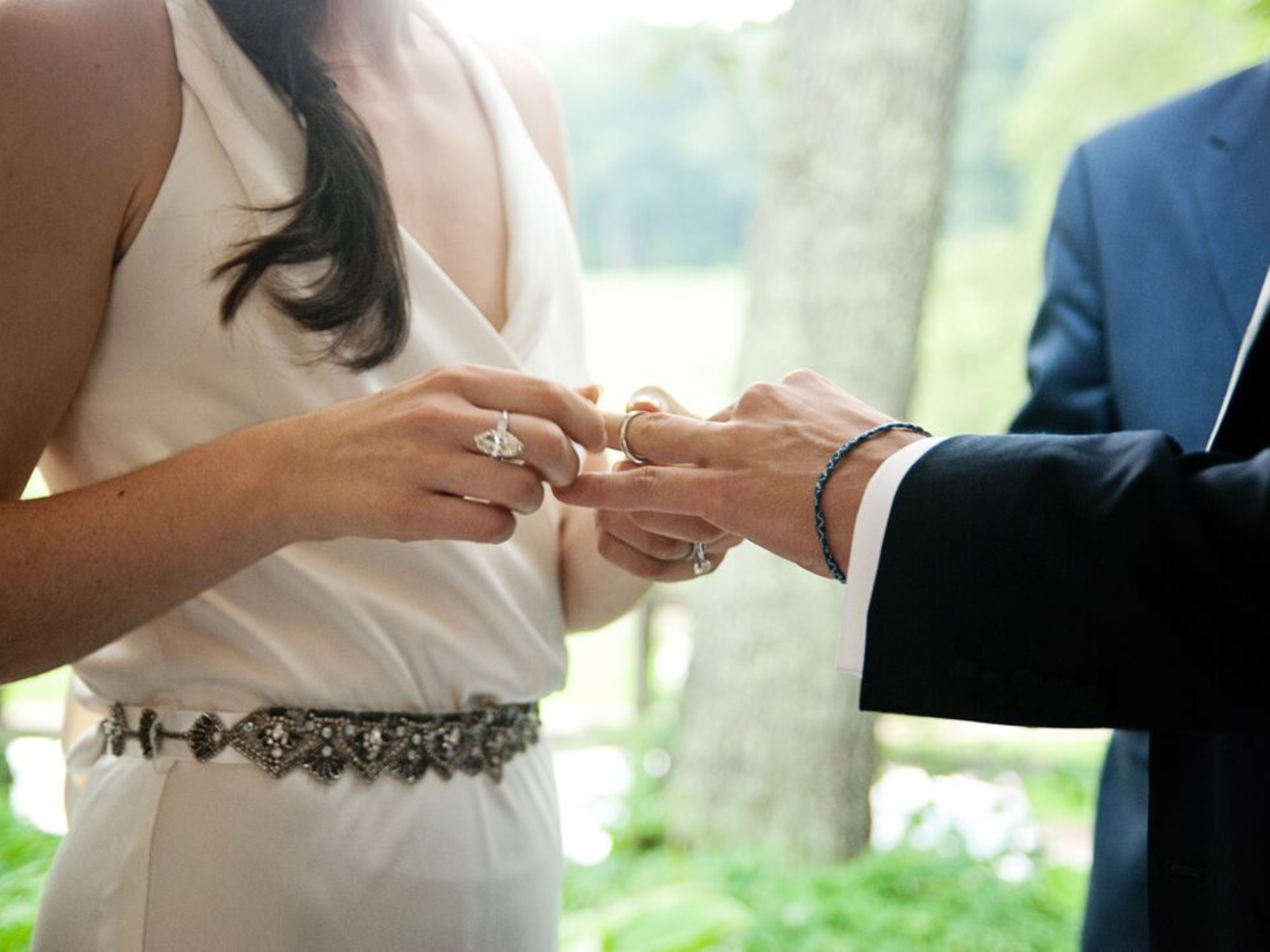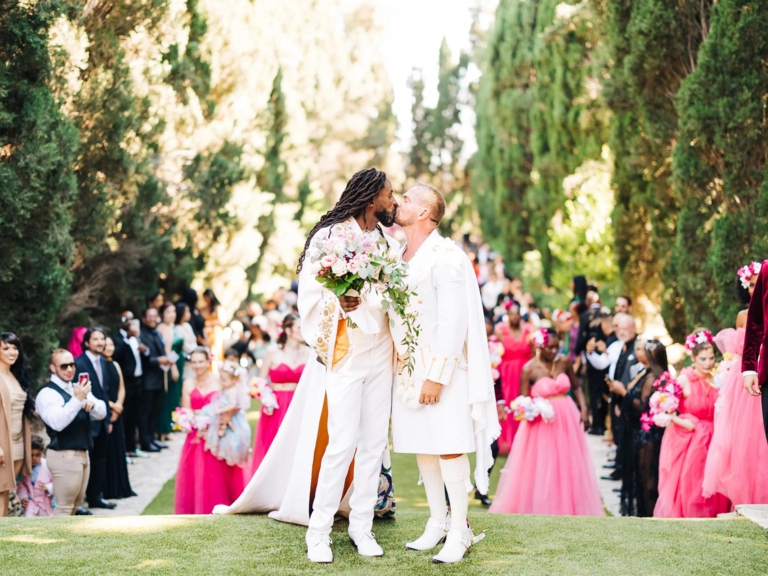Haitian Wedding Traditions to Incorporate Into Your Big Day
Whether you're looking to incorporate Haitian wedding traditions into your wedding or are attending a destination wedding in Haiti and want to know what to expect, you've landed on the right page. Although the Haiti wedding traditions included may vary by couple, informing yourself as best as possible is key to ensuring your wedding includes all of the cultural moments you want. Understanding these traditions also helps when supporting loved ones while they tie the knot.
Visit The Knot Vendor Marketplace to find pros familiar with Haitian weddings who will bring your vision to life. To learn more about Haiti wedding traditions, we tapped Stacy Armand Patterson, owner and lead designer/fashion stylist at Stacy Armand Events based in New York City and Jael JL Josecite, Cap-Haitien-based wedding planner.
In this article:
History | Prewedding | Attire | Ceremony | Reception | Food & Desserts | Postwedding
A Brief History of Haitian Wedding Traditions
It is important to note that "Haitian wedding traditions have deep roots in African, French and Caribbean cultures," Josecite explains. "These traditions originated from a blend of these influences due to Haiti's history as a French colony and its African heritage and over time, these practices have evolved, incorporating elements from various periods, including the colonial era and post-independence."
Prewedding Haitian Traditions
Haitian prewedding traditions often include parties, word-of-mouth invites and the groom's family footing a majority of the wedding bills.
Prewedding Gatherings and Engagement Parties
Although rehearsal dinners are not generally held by Haitian couples, "pre-wedding gatherings involving family and close friends are common," Patterson says. "These events may include prayers, blessings and sharing a meal together as it's a time for families to bond and prepare for the upcoming ceremony."
Word of Mouth Invitations
When sending invitations to the upcoming ceremony, Josecite notes that word of mouth is generally the delivery used by the couple, their friends and family. While couples can certainly send formal invitations, many follow the Haitian wedding tradition of personally inviting each guest.
The Groom's Family Pays
Although both families meet to discuss wedding details, it is traditionally understood that the groom and their family will pay for the entire wedding. Patterson adds that this is traditionally carried out to prove that he can provide. Whether or not the bride's family contributes varies.
Traditional Haitian Wedding Attire
Although much of the clothing worn at Haitian weddings is influenced by Western culture, couples also embrace traditional Haitian wedding attire.
To-Be-Wed's Attire
Similar to Western culture, many traditional Haitian brides wear white wedding dresses. However, embroidery on dresses is popular. Brides who opt for embroidery usually choose Haitian motifs they resonate with and are symbolic to them and their families, Patterson explains. Josecite notes that the traditional attire for Haitian grooms is tuxedos and suits.
Vibrant Colors for Guests
Many guests opt to wear brightly colored attire to traditional Haitian weddings. "Bright colors are popular, reflecting the vibrant culture of Haiti, but attire remains elegant and respectful," Patterson says.



Haitian Wedding Ceremony Traditions
What does a traditional Haitian wedding ceremony look like? Read on for some popular wedding ceremony traditions.
Church Ceremony
Since Christianity is one of the most popular religions practiced by many Haitians, most traditional Haitian couples choose to tie the knot with a religious wedding ceremony at a Christian church. These ceremonies often last between one and three hours. "The ceremony typically includes hymns, scripture readings and a sermon," Patterson says.
Dance Down the Aisle
Patterson notes that some couples opt to have their wedding party make their way down the aisle while engaging in a three-step dance to traditional Haitian music. Although this isn't the case in every Haitian wedding (especially more modern ones), it's a fun way to get the celebration started.
Religious Music
Since a traditional Haitian wedding ceremony takes place in a Christian church, it is typically accompanied by religious music. "Some include songs from multiple church choirs in addition to a full sermon from the presiding pastor," Patterson says.
Haitian Wedding Reception Traditions
Haitians do not take their wedding receptions lightly as many last all night (and sometimes into the next day). Read on to learn more about these lively celebrations of love.
Traditional and Popular Music
Josecite notes that you may find many Haitian couples opt to add traditional Haitian tunes to their reception music lineup including Haitian Kompa and Zouk. "They may sometimes have a Haitian live band or a Rara band," Patterson says. She adds that couples include these popular Haitian songs on their setlist—"Ou paka fè sa" by Dj Platnum D and "Ke M Pa Sote" by Boukman Eksperyans.
No Gifting Money
If you're attending a wedding of a traditional Haitian couple, Patterson notes that giving money as a gift is frowned upon. Instead, she recommends gifting the couple with an item that can physically help them in the next chapter of their love story.
Traditional Haitian Wedding Food and Desserts
From black rice to griot, many Haitian foods are incorporated into traditional Haitian weddings.
Signature Haitian Cuisine
You can expect to find many Haitian food staples on a wedding food menu at a traditional wedding. Patterson and Josecite note that black rice, griot, seafood and fried plantains are the most popular. While there aren't any specific food traditions that occur as part of the celebration, the food is often served buffet-style and routinely throughout the reception. You also shouldn't be surprised to see Haitian vanilla cake on the dessert table at the end of the night, adds Josecite.
Haitian Postwedding Traditions
The fun doesn't stop just because the official ceremony has ended. Many Haitian couples continue to celebrate for days after.
Regular Family Visits
As a part of Haitian wedding traditions, newlyweds can expect their close family and friends to visit the days after the formal ceremony. Patterson notes that family members may continue to give gifts during this time.





















